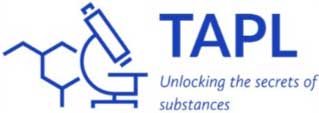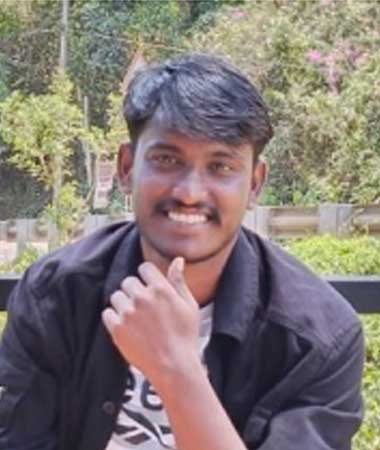Research
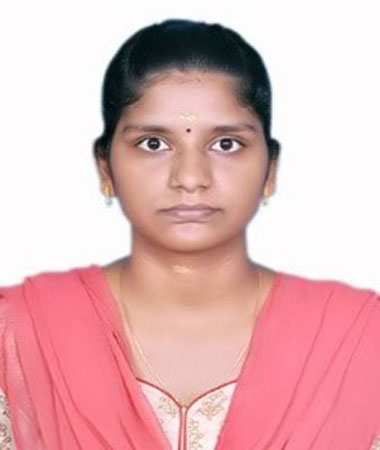
Dr. Meenatchi.R
UGC-Dr. D.S. Kothari Postdoctoral Fellow
Email : meenatchiramu20@gmail.com
- Dr. Meenatchi. R, who has completed her Ph.D. in Microbiology from Pondicherry University, Puducherry, has been awarded the prestigious ‘Dr. D.S. Kothari Postdoctoral Fellowship’ by University Grants Commission (UGC), Government of India.
- Her research work focuses on unraveling the interkingdom signaling pathways and interaction mechanisms involved in coral (bacteria-Symbiodiniaceae) endosymbiosis. Coral reefs are diverse marine ecosystems housing various endemic marine organisms and serve as a means of economic identity to people along the coastline through tourism and aquaculture, and also prevent the shores from erosion due to high-impact waves, a source of various bioactive metabolites.
- During her Ph.D., Dr. Meenatchi studied endosymbiotic diversity and recorded their composition present in Indian corals, especially on the South-East Coast of India (Palk Bay), for the first time.
- She has also documented that one of the coral species, namely Favites abdita, predominant in India, can resist mass bleaching that happened during 2015-16 El Niño effect because of the presence of stress-tolerant endosymbiont, Durusdinium (Clade D), a dinoflagellate alga existing as an obligate endosymbiont in corals.
- Currently, she is working on the interactive abilities of dual endosymbionts of corals using sea anemone as a model organism. Conservation of corals can save most of the endemic fish species and the marine ecosystem.
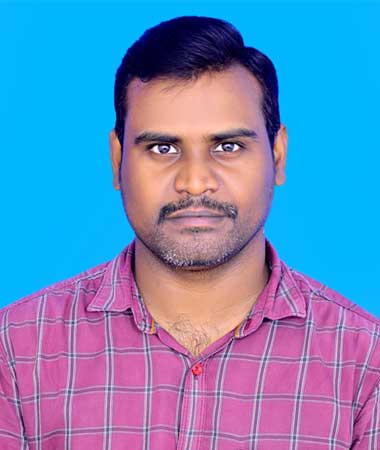
Dr. Suthi Subbarayudu
Institute Postdoctoral Fellow
Email : s.s.rayudubio@gmail.com
- Dr. Suthi Subbarayudu obtained his Ph.D. in Biotechnology from Sri Venkateswara Institute of Medical Sciences (SVIMS), AP, India.
- He is currently screening marine microbial samples for the production of new antiquorum sensing quorum quenchers (QQ) to combat food spoilage bacterial strains.
- His research also focuses on how environmental factors affect interactions between Staphylococcus aureus and Acinetobacter baumannii.
- He is also concentrating on studying the impact of different carbon sources on the growth kinetics, expression of virulence factors, and biofilm formation of Staphylococcusb aureus and Acinetobacter baumannii in both mono and co-culture conditions.
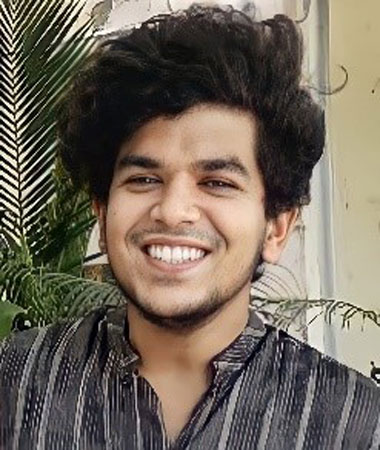
Gokul.S
Research scholar
Email : gokulsudhakaran98@gmail.com
- Mr. Gokul. S is a Research scholar, Department of Biotechnology currently working on evaluating plant-based small molecules and their semi-natural analogs in alleviating oxidative stress and inflammation in Zebrafish models on PCOS and diabetic complications, under the guidance of Prof. A. Jesu Arockia Raj (Research), Department of Biotechnology, College of Science and Humanities, SRMIST, Kattankulathur.
- His research interests includes toxicology of small molecules, and bioactivity of plantderived small molecules against human diseases
- He is also working on in-vitro anti-cancer and PCOS models.
- He also received the Young Researcher Award at the International Conference on Trends in Biological Sciences: Impetus on Human Health. ICBS-2023, SRM Arts and Science College, Kattankulathur.
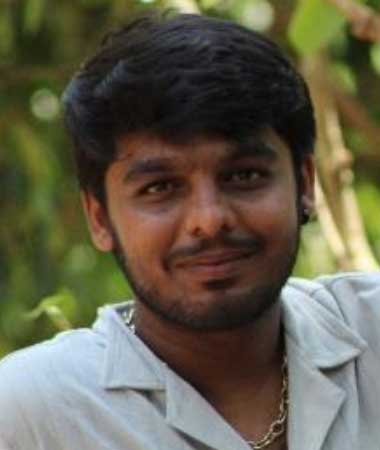
Hari Deva Muthu
Research scholar
Email : haridev225@gmail.com, haridevamuthu@yahoo.co.in
- Mr. Hari Deva Muthu – Ph.D. Research Scholar currently focused on mitigation strategies for xenobiotic-induced neurotoxicity using synthetic molecules.
- His work involves synthesizing and testing molecules that can target specific molecular pathways involved in neurotoxicity caused by xenobiotics. These synthetic molecules can be developed to either prevent the toxic effects of the xenobiotic or to mitigate the damage caused by them.
- Molecules are designed to be highly specific, targeting only the molecular pathways involved in neurotoxicity while leaving other pathways unaffected. This specificity can help to minimize the risk of side effects associated with conventional neuroprotective drugs.
- He developed assays to measure these effects on animal behavior, neuronal morphology, and gene expression.
- He believes that these function modifies small molecules can potentially revolutionize the treatment of neurological disorders caused by xenobiotic exposure.
- He studied the potential health risk caused by a regularly consumed food dye known as Tartrazine in developmental zebrafish model which was published in ‘Journal of Hazardous Materials’.
- He also have keen interest in the fabrication of sustainable products and have developed a biodegradable food packaging film from biowaste of Terminalia catappa and this work has been published in ‘Carbohydrate Polymer’.
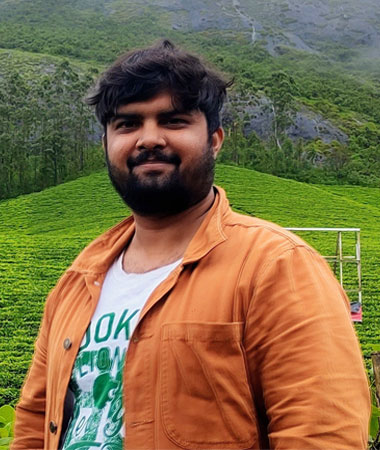
M. Raghul
Research scholar
Email : raghulmurugan368@gmail.com
- Mr. M. Raghul, Research scholar focusing on exploration of phytocompounds and their derivatives as treatment remedy for oxidative stress and inflammation mediated diseases.
- It involves testing antioxidant mechanism of therapeutics that mitigates the onset of neuronal degeneration and other organ damages due to inflammation induced by exposure to toxic chemicals.
- He is also working on development of treatment strategies for infections caused by bacterial biofilms using larvae and adult zebrafish model. Besides, evaluating multivalent potential of phytocompounds that exerts anti-inflammatory and antibacterial activity.
- He also works in synthesizing of nanocomposites for targeted delivery of phytocompounds and essential oil.
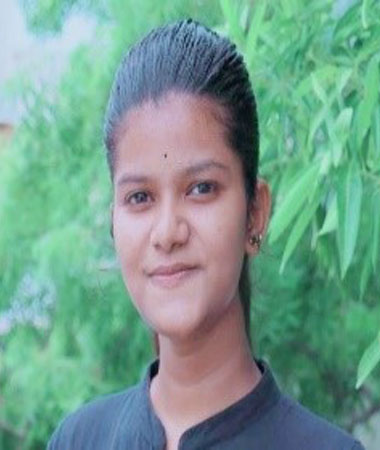
P. Snega Priya
DST-INSPIRE Junior Research Fellow
Email : snegapriya1997@gmail.com
- P. Snega Priya is pursuing her Ph.D. in a research proposal entitled "Unraveling the potentials of flavonoids as dietary supplements for effective osteoporosis management: Implications on targeting molecular pathways".
- Her research work mainly focuses on global health issues related to bone health, a disorder known as osteoporosis. Osteoporosis is the most common metabolic bone loss disorder, a significant public health concern contributing to around 8.9 million fractures per annum worldwide. Her focus is to determine the regulatory effects of plant-derived compounds as bone-protective agents. Her proposed research will aid in the formation of novel drugs or dietary supplements with low or no side effects to effectively manage osteoporosis and increase the quality of life of patients.
- She has also investigated the synergetic effects of prebiotics (Polysaccharide Gel extracted from durian fruit) and probiotics (B. subtilis) with co-inoculation of A. nauplii to assess the changes in the serum immune cells to understand the hematological response and growth parameters, and water quality effects infused in zebrafish.
- She is also exploring the research in toxicological aspects of environmental pollutants such as particulate matter and heavy metals in vivo.
- She has recently identified that a wildfire residual methoxyphenol syringol could cause cytotoxicity and teratogenicity in the zebrafish model and published in Science of The Total Environment.
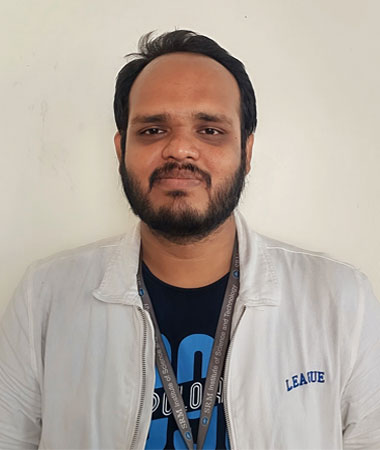
S.P Ramya Ranjan Nayak
Research Scholar
Email : ramyaranjan2255@gmail.com
- Mr. S.P Ramya Ranjan Nayak is a research scholar mainly focuses on investigating "The role of gut microbial metabolites in cardiovascular dysfunctions using mammalian disease models".
- He has also been studying the therapeutic potential of various phytocompounds in vitro and in vivo using zebrafish infection and disease models.
- Mr. Nayak has also evaluated the effectiveness of luteolin, an anti-quorum sensing molecule, in protecting zebrafish from Pseudomonas aeruginosa infection.
- Furthermore, he has a keen interest in eco-toxicology research.
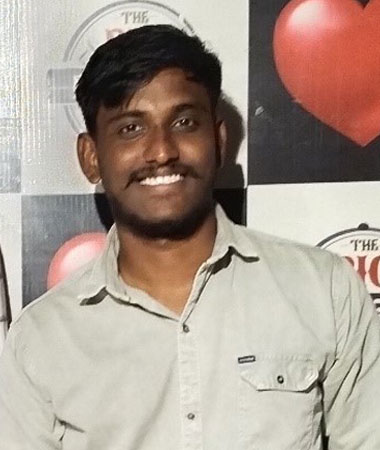
Madesh.S
Project Intern
Email : madesh.sd312@gmail.com
- Mr. Madesh.S is a research scholar interested in determining the Eco-toxicity of cadmium and ketoprofen in zebrafish. It involves determining chemical accumulation rates in zebrafish as well as analyzing tissue damage caused by pollution exposure.
- He is also investigating neurodegeneration in an adult zebrafish model that has been exposed to cadmium in the presence of ketoprofen.
- He has also investigated the transgenerational effects of heavy metals and NSAIDs on zebrafish.
- He is also interested in the anti-inflammatory and anti-teratogenic activities of semi-synthetic phyto-compounds in zebrafish..
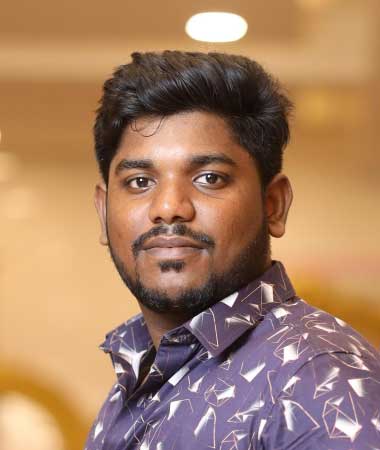
Karthikeyan R
Research Scholar
Email : karthibiotech18@gmail.com
- Mr. Karthikeyan R is a research scholar in the Department of Biotechnology currently working on investigating the textile azo dye toxicity in Zebrafish models.
- His research interests include the toxicology of environmental contaminants and the bioactivity of plant-derived synthetic compounds against human diseases
- He is also working on microplastic and nanoplastic degradation by novel fungal strains.
- He did his final year dissertation on -1077 Single Nucleotide Polymorphism from Tb patients and Health control using Restriction Fragment Length Polymorphism’ at ICMR- National Institute of Research in Tuberculosis, Central Government of India, Chetpet, Chennai.

Sanjai Dharshan S
Research Scholar
Email : sanjaidharshansd2907@gmail.com
- Mr. Sanjai Dharshan is a committed research scholar who presently works at the SRM Institute of Science and Technology.
- He earned his Master's degree from Alagappa University in Karaikudi, where he focused on "Mass cultivation of microalgae as an entrepreneurial venture and evaluating its anti-quorum sensing potential against Vibrio spp.".
- His current study focuses on the toxicity of environmentally hazardous substances and their possible consequences both in vivo and in vitro. He primarily investigates the mechanism, the gene and its expression, and the disorders connected with it.
- He is well-versed in Molecular and microbiological techniques and understands fundamental bioinformatics and network pharmacology.
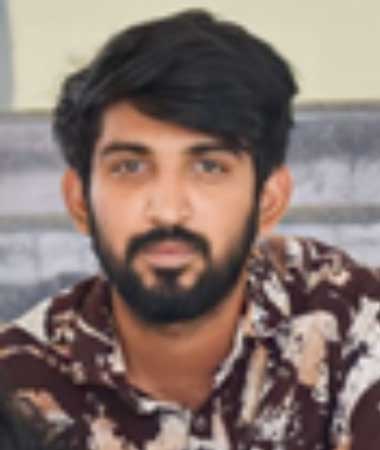
D Kesavan
Project Associate I (MoES funded project)
Email : damokesav@gmail.com
- Mr. Kesavan is a project associate, currently working on the MOES funded project titled “Mining the deep ocean metagenomes: Exploration of quorum quenching enzymes as cryo-preservative to prevent spoilage in food processing sector” under the guidance of Prof. A. Jesu Arockia Raj (Research), Department of Biotechnology, College of Science and Humanities, SRMIST, Kattankulathur.
- His research interests includes toxicological effect of food and textile dye on aquatic animals.
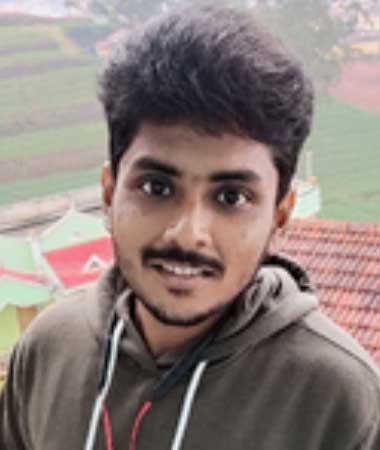
R. Mohanakrishna
Project Associate I (MoES funded project)
Email : mohanakrishna31199@gmail.com
- Mr. Mohanakrishna is a project associate, currently working on the MOES funded project titled “Mining the deep ocean metagenomes: Exploration of quorum quenching enzymes as cryo-preservative to prevent spoilage in food processing sector” under the guidance of Prof. A. Jesu Arockia Raj (Research), Department of Biotechnology, College of Science and Humanities, SRMIST, Kattankulathur.
- His research interests includes isolation of potential fungi and extraction of their bioactive compounds.
